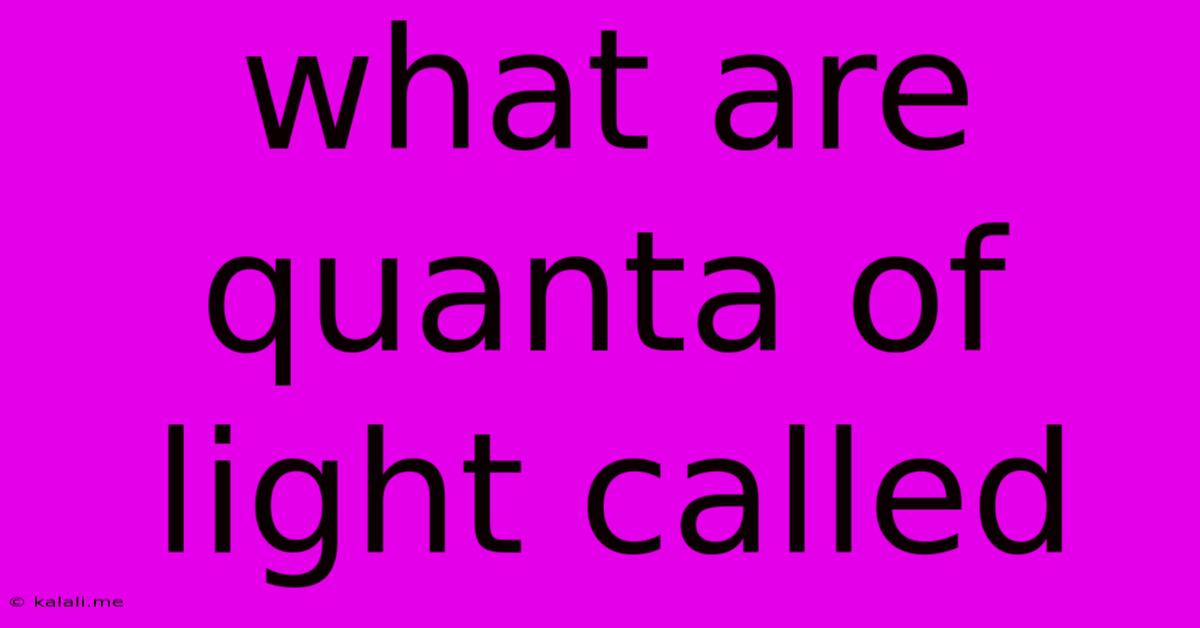What Are Quanta Of Light Called
Kalali
May 09, 2025 · 3 min read

Table of Contents
What are Quanta of Light Called? Understanding Photons
Have you ever wondered what the smallest unit of light is? This fundamental building block of light is incredibly important to our understanding of the universe, from the way we see to the workings of lasers and solar panels. This article will delve into the fascinating world of light quanta and explain precisely what they're called.
The answer, simply put, is photons. Photons are elementary particles that are responsible for carrying electromagnetic radiation, including light. They are massless and travel at the speed of light. Understanding photons helps us explain numerous phenomena related to light and its interactions with matter.
The Birth of the Photon Concept
The concept of the photon wasn't always understood. Classical physics struggled to explain certain properties of light, such as the photoelectric effect, where electrons are emitted from a material when light shines on it. Albert Einstein's groundbreaking work in 1905 proposed that light energy was quantized, meaning it exists in discrete packets, which he called "light quanta." This revolutionary idea earned him the Nobel Prize in Physics. Later, the term "photon," derived from the Greek word "phos" meaning light, was adopted.
Key Characteristics of Photons
Several key characteristics define photons and differentiate them from other particles:
- Massless: Photons have no mass, which is why they can travel at the speed of light.
- Speed of Light: They always travel at the speed of light in a vacuum (approximately 299,792,458 meters per second).
- Wave-Particle Duality: Photons exhibit both wave-like and particle-like properties. This is a fundamental concept in quantum mechanics, demonstrating the duality of nature at a subatomic level. This duality is evident in phenomena like diffraction (wave-like) and the photoelectric effect (particle-like).
- Energy and Wavelength: A photon's energy is directly proportional to its frequency (and inversely proportional to its wavelength). Higher frequency light (like blue or ultraviolet) has higher energy photons than lower frequency light (like red or infrared). This relationship is described by the equation E = hf, where E is energy, h is Planck's constant, and f is frequency.
- Momentum: Despite being massless, photons possess momentum. This momentum is responsible for the pressure exerted by light, known as radiation pressure. This is the principle behind solar sails, a proposed method of space propulsion.
- Spin: Photons have an intrinsic angular momentum, called spin, of 1. This means they are bosons, particles that follow Bose-Einstein statistics.
The Importance of Photons
Photons are not just a theoretical concept; they're fundamental to many aspects of our world and technology. They are crucial to:
- Vision: The process of seeing relies on photons interacting with the photoreceptor cells in our eyes.
- Photosynthesis: Plants use photons to drive photosynthesis, the process by which they convert light energy into chemical energy.
- Lasers: Lasers function by stimulating the emission of photons in a coherent manner, creating a focused and intense beam of light.
- Solar Panels: Solar panels convert the energy of photons into electricity.
- Medical Imaging: Techniques like X-rays and PET scans use photons to image the inside of the human body.
In conclusion, the quanta of light are called photons. These remarkable particles are not only responsible for the light we see but also underpin numerous crucial processes in nature and technology. Understanding their properties is essential to grasping many fundamental concepts in physics and engineering.
Latest Posts
Latest Posts
-
Cuanto Es Media Pulgada En Milimetros
May 09, 2025
-
What Is 5 Out Of 12 As A Percentage
May 09, 2025
-
19 2 As A Mixed Number
May 09, 2025
-
Cuanto Son 2 Onzas En Ml
May 09, 2025
-
How Many Cm Is 9 Feet
May 09, 2025
Related Post
Thank you for visiting our website which covers about What Are Quanta Of Light Called . We hope the information provided has been useful to you. Feel free to contact us if you have any questions or need further assistance. See you next time and don't miss to bookmark.